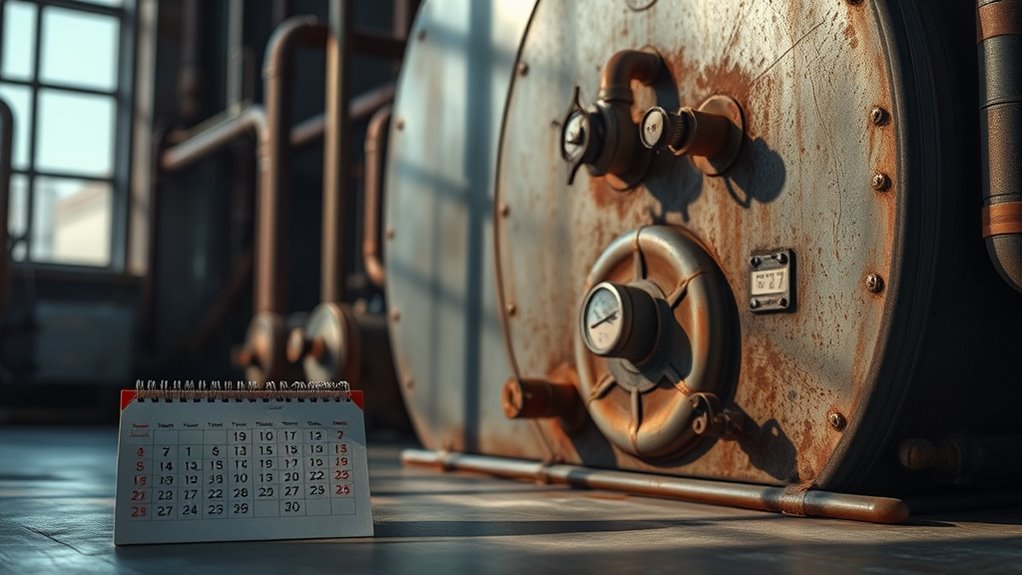A boiler typically lasts between 10 to 20 years, depending on its type and maintenance. Standard residential models last 10 to 15 years, while higher-efficiency units can reach 20 years or more. Factors like material quality, installation, and regular upkeep greatly impact longevity. If you notice unusual noises, rising energy costs, or uneven heating, it might be time for a replacement. Understanding these aspects can help you make the best choice for your heating needs.
Key insights
- Standard residential boilers typically last 10 to 15 years, while higher-efficiency models can exceed 20 years.
- Combi boilers generally have a lifespan of 10 to 12 years, whereas system boilers may last longer due to robust construction.
- Gas boilers typically last between 10 to 15 years, while oil boilers can last 15 to 20 years or more.
- Electric boilers can potentially reach 20 to 30 years with proper maintenance and care.
- Regular maintenance and quality installation significantly influence the longevity and performance of a boiler.
Understanding Boiler Types and Lifespan
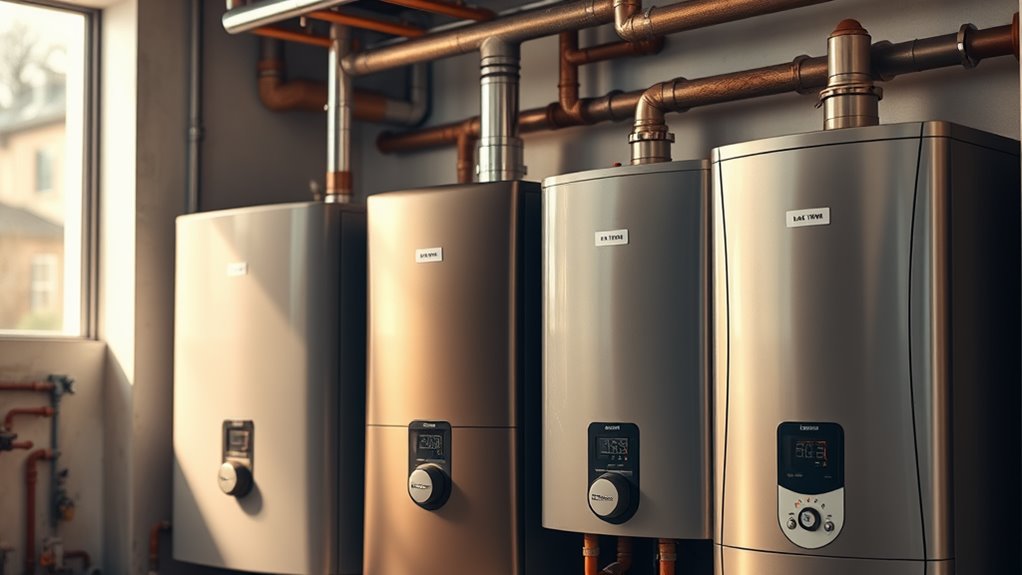
When considering how long a boiler should last, it is vital to understand the different types of boilers and their typical lifespans. Generally, a standard residential boiler can last between 10 to 15 years, while higher-efficiency models may extend this to 20 years or more. Combi boilers, known for their compact design and high boiler efficiency, typically last around 10 to 12 years. On the other hand, system boilers may last slightly longer due to their robust construction. Your heating requirements directly influence the lifespan; under-sizing a boiler can lead to increased wear and tear, reducing efficiency and longevity. Regular maintenance is essential, as it helps guarantee your boiler operates effectively and meets your heating needs over time. Additionally, regular maintenance can significantly enhance the longevity and efficiency of the system.
Factors Affecting Boiler Longevity
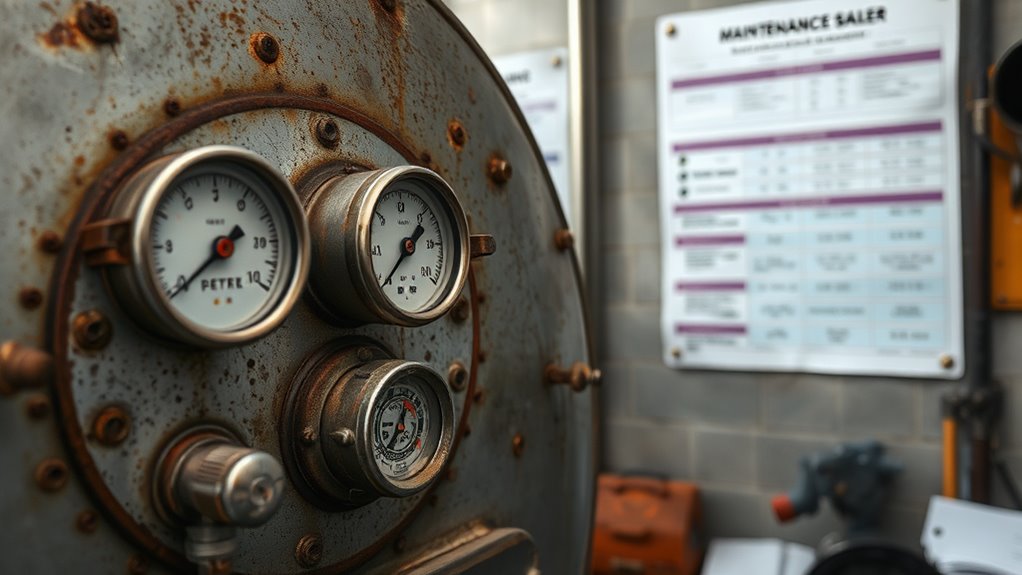
Several factors greatly influence the longevity of your boiler beyond its type and initial quality. The choice of boiler materials plays a vital role; higher-quality metals and components can withstand wear and tear better than cheaper alternatives. Additionally, proper installation quality is essential; if your boiler is not installed correctly, it can lead to inefficiencies and premature breakdowns. Regular maintenance is another factor that shouldn't be overlooked; routine check-ups help identify issues early and keep your boiler running smoothly. Operating conditions, such as water quality and pressure levels, also impact longevity. By focusing on these factors, you can markedly extend your boiler's lifespan and guarantee peak performance throughout its operational life. Furthermore, adhering to UK gas safety regulations during servicing ensures compliance and enhances operational longevity.
Signs Your Boiler May Need Replacement
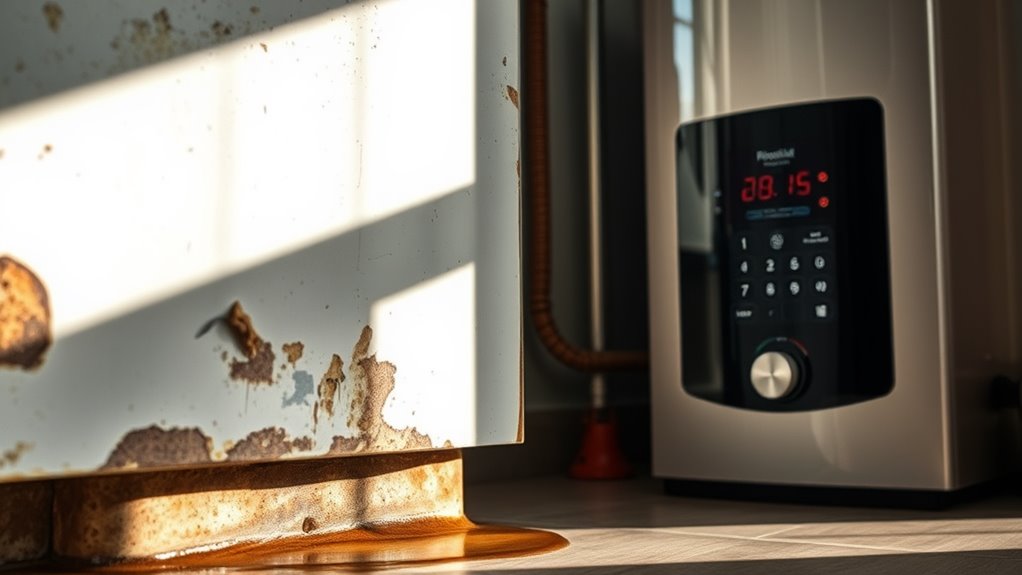
While regular maintenance can extend your boiler's life, certain signs indicate it may be time for a replacement. If you're frequently hearing unusual boiler noises, such as banging or gurgling, it's a warning sign that internal components may be failing. Additionally, if you notice a significant increase in your heating bills without any changes in usage, that's another red flag. An inefficient boiler can lead to higher energy costs, pushing you to reconsider your current system. Also, if your home isn't heating evenly or you experience frequent breakdowns, it's likely more cost-effective to invest in a new unit. Paying attention to these indicators can save you from further inconveniences and unexpected expenses. Regular maintenance and servicing prevent boiler errors and ensure optimal performance.
Regular Maintenance for Extended Lifespan
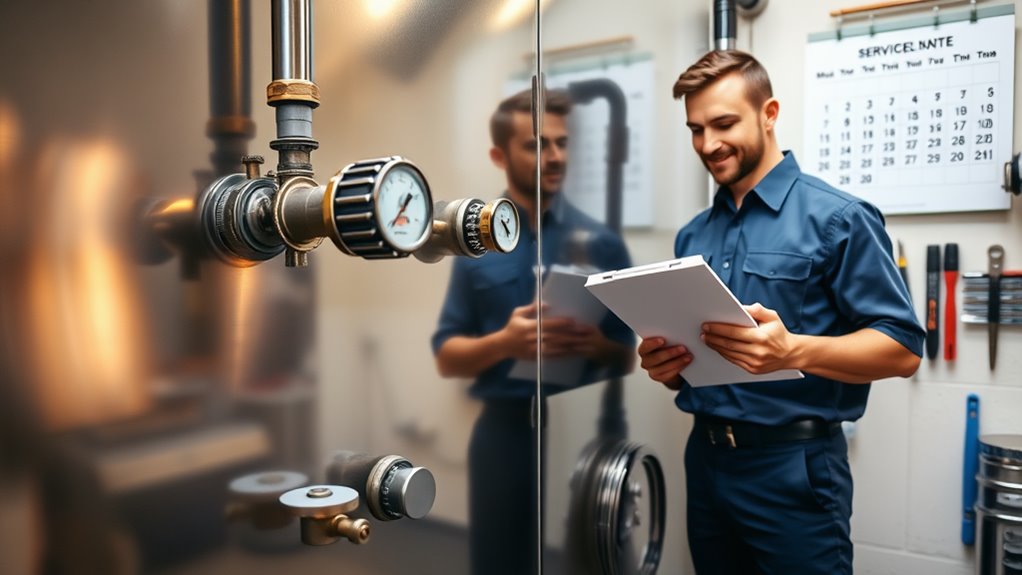
Regular maintenance is essential for maximizing your boiler's lifespan. Annual inspections help identify potential issues before they escalate, while routine cleaning guarantees efficient operation. By prioritizing care, you not only enhance performance but also save on future repair costs. Additionally, preventative maintenance is crucial for ensuring that all components of your boiler are functioning optimally and to prevent costly breakdowns.
Importance of Annual Inspections
Annual inspections play an important role in maintaining your boiler's efficiency and longevity. By scheduling these inspections, you reap significant annual benefits, including improved safety and reduced energy costs. A thorough inspection checklist typically includes checks for leaks, corrosion, and proper function of safety devices. During these assessments, a professional can identify potential issues before they escalate, saving you from costly repairs and downtime. Additionally, regular inspections help guarantee compliance with local regulations, which can prevent legal complications. By prioritizing these inspections, you're investing in the reliability of your boiler and extending its operational life. Don't overlook this vital aspect of boiler maintenance—make it a priority to schedule your annual inspections today. Furthermore, regular maintenance contributes to lower operational costs by enhancing system efficiency and reducing energy consumption.
Routine Cleaning and Care
To guarantee your boiler operates efficiently and has a long lifespan, routine cleaning and care are essential. Establishing a regular maintenance and cleaning schedule can prevent issues that lead to costly repairs or replacements. Here are key tasks to include:
- Inspect and clean the heat exchanger to remove any build-up that may impede performance.
- Check and replace filters regularly to ensure maximum airflow and efficiency.
- Bleed radiators to eliminate trapped air, improving heating efficiency.
- Monitor water levels and pressure to maintain proper operation and identify leaks early. Regular maintenance helps prevent error codes and enhances boiler longevity.
Average Lifespan of Different Boiler Types
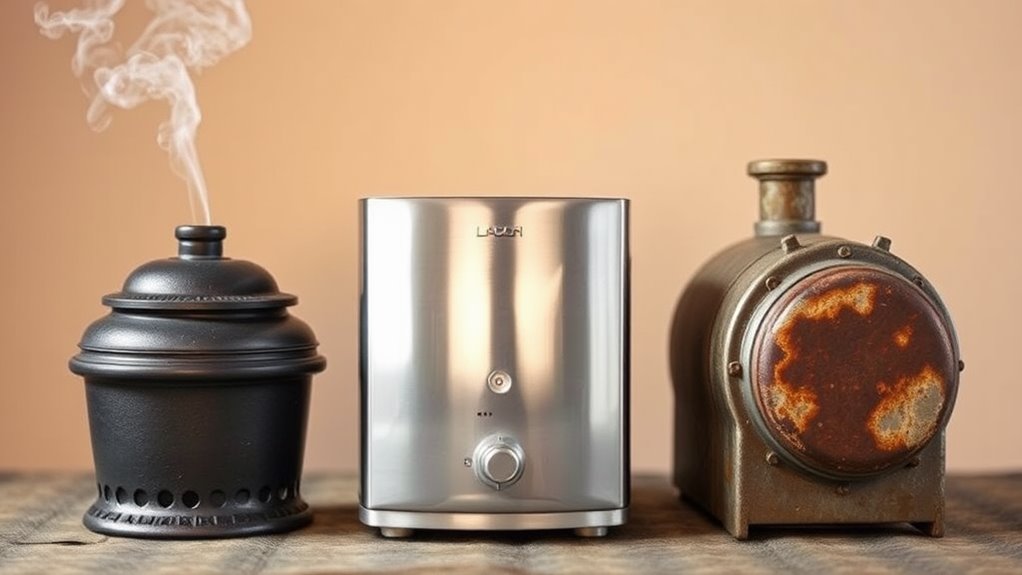
When considering the average lifespan of various boiler types, you'll find notable differences in longevity. Gas boilers typically last between 10 to 15 years, while oil boilers can serve you for 15 to 20 years. Electric boilers generally have a longer lifespan, often reaching up to 20 to 30 years with proper care. Additionally, commercial heat pumps may provide an alternative solution with a lifespan of up to 20 years, offering energy-efficient heating and cooling for large buildings.
Gas Boilers Lifespan
Gas boilers typically last between 10 to 15 years, depending on factors like maintenance, usage, and the quality of installation. To maximize your boiler's longevity and efficiency, consider the following:
- Regular maintenance checks to guarantee peak boiler efficiency
- Utilizing high-quality installation practices
- Correct sizing for your home to prevent overworking the system
- Exploring replacement options before significant breakdowns occur
- Staying informed about error codes can help identify issues early and maintain optimal performance.
Oil Boilers Longevity
Oil boilers generally have a lifespan of 15 to 25 years, often outlasting their gas counterparts. Their longevity largely depends on regular oil boiler maintenance. Routine inspections and timely servicing can considerably enhance efficiency and prolong the unit's life. Neglecting maintenance can lead to decreased oil boiler efficiency, causing wear and tear that shortens the lifespan.
Additionally, the quality of the oil used and the installation process play vital roles in determining how long your boiler will last. By staying proactive with maintenance tasks, like cleaning filters and checking for leaks, you guarantee that your oil boiler operates at peak efficiency. Ultimately, investing in proper care can maximize your oil boiler's performance and longevity. Regular maintenance can help prevent issues like E37 error codes, which can disrupt heating and reduce the boiler's lifespan.
Electric Boilers Durability
Although electric boilers typically have a shorter lifespan than oil boilers, they can still last between 10 to 15 years with proper maintenance. Understanding the features and maintenance requirements of electric boilers is essential for maximizing their durability. Regular checks and servicing can guarantee peak performance and longevity.
- Quality Components: Investing in high-quality electric boiler features increases reliability.
- Routine Maintenance: Regularly inspect and clean the system to prevent issues.
- Water Quality: Use soft water to prevent scaling and damage.
- User Awareness: Stay informed about any unusual noises or performance changes. Additionally, monitoring pressure levels can help detect potential issues early.
Energy Efficiency and Its Impact on Longevity
Energy efficiency plays an essential role in determining the lifespan of your boiler, as it directly affects not only performance but also maintenance requirements. Higher efficiency ratings mean your boiler operates more effectively, leading to significant energy savings over time. When your boiler runs at peak efficiency, it experiences less wear and tear, reducing the risk of breakdowns and prolonging its life. Regular maintenance becomes easier and less costly, as efficient systems tend to require fewer repairs. Conversely, low-efficiency boilers often lead to increased energy consumption, putting more strain on components and shortening their lifespan. As a result, investing in a high-efficiency boiler is vital for maximizing longevity and minimizing operational costs.
Making the Right Choice for Your Home's Heating Needs
When choosing the right heating system for your home, how do you guarantee it meets your specific needs? Start with a thorough boiler selection process, focusing on heating efficiency and your home's layout. Consider the following factors to make an informed decision:
- Home size and insulation: Larger homes may need more powerful systems.
- Fuel type availability: Check what's accessible in your area for cost-effectiveness.
- Boiler type: Evaluate options like combi, system, or regular boilers based on your hot water needs.
- Energy efficiency ratings: Look for models with high ratings to lower long-term costs.
Frequently Asked Questions
Can I Extend My Boiler's Lifespan With DIY Repairs?
Yes, you can extend your boiler's lifespan with DIY repairs, but it requires careful attention. Start with boiler maintenance tips like checking the pressure and bleeding radiators. Common DIY fixes include replacing worn-out parts, cleaning filters, and ensuring proper insulation. However, always prioritize safety and consult a professional for complex issues. Regular maintenance can greatly improve efficiency and longevity, saving you money in the long run while keeping your system running smoothly.
How Often Should I Replace My Boiler's Filters?
You should replace your boiler's filters every one to three months, depending on usage and filter type. Regular filter maintenance guarantees peak efficiency and prolongs your boiler's lifespan. If you've got pets or live in a dusty environment, consider more frequent replacements. Always check the manufacturer's guidelines for specific recommendations. Keeping an eye on filter condition not only enhances performance but also helps prevent costly repairs down the line.
What Noise Indicates a Boiler Is Failing?
When you notice unusual boiler noises, it's a critical indicator of possible failure signs. Listen for banging, clanking, or gurgling sounds, as these often signal issues like air trapped in the system or sediment buildup. Hissing noises may indicate a leak, while whistling could suggest pressure problems. Don't ignore these sounds—address any concerning noises promptly to prevent further damage and guarantee your boiler operates efficiently. Regular maintenance can help mitigate these risks.
Do Different Fuel Types Affect Boiler Longevity?
Yes, different fuel types can greatly affect boiler longevity. For instance, gas boilers often have a longer lifespan due to their cleaner combustion, resulting in better fuel efficiency. In contrast, oil boilers may require more frequent maintenance practices to prevent buildup and corrosion. Regular servicing is essential, regardless of fuel type, as it guarantees peak performance and can extend the boiler's life, minimizing the risk of premature failure.
Is It Worth Investing in a High-Efficiency Boiler?
Investing in a high-efficiency boiler is definitely worth it. You'll benefit from significant energy savings, which can lower your utility bills. While the upfront cost may be higher, think of it as a long-term investment. Over time, the reduced energy consumption will offset the initial expense, leading to overall savings. Additionally, these boilers often have longer lifespans, further enhancing their value. You'll appreciate the comfort and efficiency they bring to your home.
Summary
In conclusion, understanding your boiler type and its average lifespan can help you make informed decisions about maintenance and replacement. Regular upkeep is essential to extend your boiler's longevity, while recognizing the signs of wear can prevent costly breakdowns. Consider energy efficiency in your choice to guarantee peak performance. By staying proactive, you can enjoy a reliable heating system that meets your home's needs for years to come. Choose wisely to maximize your investment.

